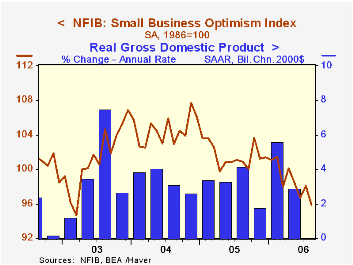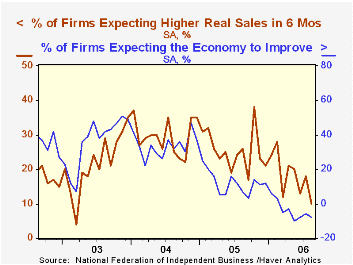 Global| Sep 12 2006
Global| Sep 12 2006Small Business Optimism At A Three Year Low
by:Tom Moeller
|in:Economy in Brief
Summary
Small business optimism in August reversed all of the prior month's uptick and fell 2.2%, according to the National Federation of Independent Business (NFIB). At 95.9 the index was at its lowest level since March of 2003. During the [...]

Small business optimism in August reversed all of the prior month's uptick and fell 2.2%, according to the National Federation of Independent Business (NFIB). At 95.9 the index was at its lowest level since March of 2003.
During the last ten years there has been a 70% correlation between the level of the NFIB index and the two quarter change in real GDP.
Respondents expecting the economy to improve fell moderately but the percentage expecting higher real sales in six months plunged.
The percentage of firms planning to increase employment improved to the highest level since January and the number of firms currently with one or more job openings rose slightly. During the last ten years there has been a 72% correlation between the NFIB percentage and the y/y change in nonfarm payrolls.
The percent planning to raise capital expenditures fell to 28%, below the 32% of last year..The percentage of firms planning to raise average selling prices slipped back to 29% and the percentage of firms actually raising prices also slipped to 22%. During the last ten years there has been a 60% correlation between the change in the producer price index and the level of the NFIB price index.
About 24 million businesses exist in the United States. Small business creates 80% of all new jobs in America.
Evolution of Retail Payments and the Role of the Federal Reserve, yesterday's speech by Federal Reserve Board Vice Chairman Donald L. Kohn, is available here.
| Nat'l Federation of Independent Business | August | July | Y/Y | 2005 | 2004 | 2003 |
|---|---|---|---|---|---|---|
| Small Business Optimism Index (1986=100) | 95.9 | 98.1 | -5.0% | 101.6 | 104.6 | 101.3 |
Tom Moeller
AuthorMore in Author Profile »Prior to joining Haver Analytics in 2000, Mr. Moeller worked as the Economist at Chancellor Capital Management from 1985 to 1999. There, he developed comprehensive economic forecasts and interpreted economic data for equity and fixed income portfolio managers. Also at Chancellor, Mr. Moeller worked as an equity analyst and was responsible for researching and rating companies in the economically sensitive automobile and housing industries for investment in Chancellor’s equity portfolio. Prior to joining Chancellor, Mr. Moeller was an Economist at Citibank from 1979 to 1984. He also analyzed pricing behavior in the metals industry for the Council on Wage and Price Stability in Washington, D.C. In 1999, Mr. Moeller received the award for most accurate forecast from the Forecasters' Club of New York. From 1990 to 1992 he was President of the New York Association for Business Economists. Mr. Moeller earned an M.B.A. in Finance from Fordham University, where he graduated in 1987. He holds a Bachelor of Arts in Economics from George Washington University.
More Economy in Brief
 Global| Feb 05 2026
Global| Feb 05 2026Charts of the Week: Balanced Policy, Resilient Data and AI Narratives
by:Andrew Cates






